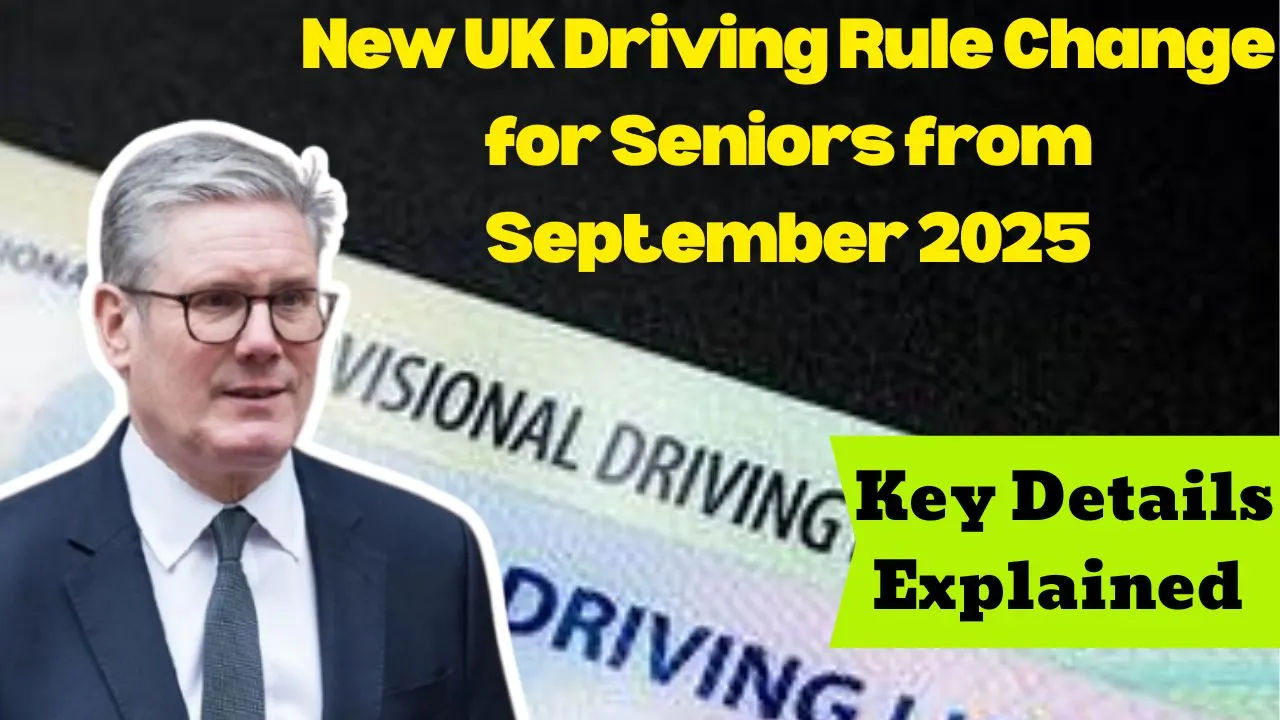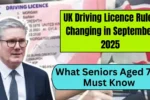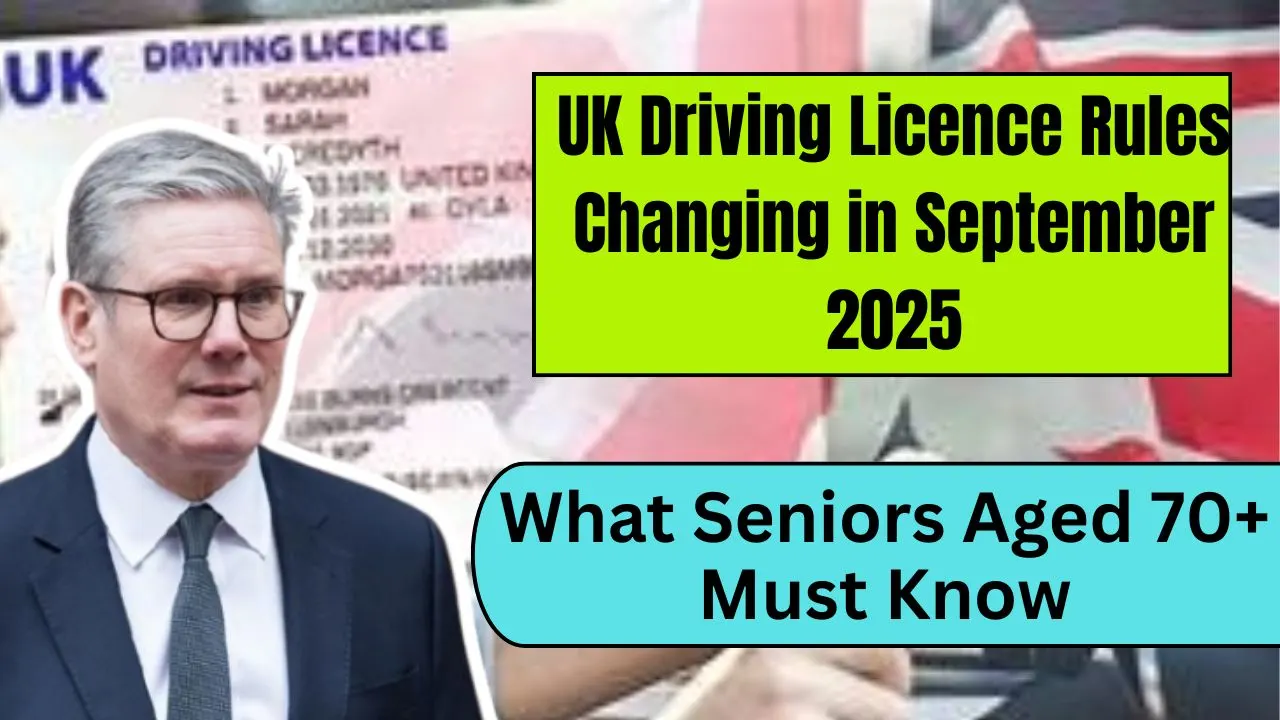The UK Driving Rule Change for Seniors 2025 is set to bring one of the most significant updates to driver licence laws for older adults in decades. Starting September 1, 2025, drivers aged 70 and above will need to pass a mandatory medical assessment to renew their driving licence. For many, this shift raises concerns about freedom, independence, and safety on the roads.
But here’s the good news: the UK Driving Rule Change for Seniors 2025 isn’t about taking licences away. It’s about making sure drivers stay safe both for themselves and others. In this post, we’ll explain exactly what the new rules mean, who’s affected, how to prepare for the changes, and what to expect during the process. Whether you’re approaching 70 or helping a parent through the renewal process, this guide covers it all.
UK Driving Rule Change for Seniors 2025: What It Means for You
The UK Driving Rule Change for Seniors 2025 introduces a mandatory medical assessment for all drivers aged 70 and above before they can renew their licence. Unlike the old system, which relied on self-declared health status, this new rule requires official confirmation from a medical professional. These assessments must now be completed every three years and will cover key areas such as eyesight, memory, reaction times, and overall physical health. The goal is not to take licences away but to ensure drivers remain safe and capable behind the wheel. With age-related conditions often developing slowly and unnoticed, this structured health check helps detect issues early. It offers reassurance for both families and road users, while allowing healthy seniors to maintain their freedom and independence responsibly.
Overview Table: UK Driving Rule Change for Seniors 2025
| Detail | Information |
| Effective Date | September 1, 2025 |
| Who It Applies To | All UK drivers aged 70 and over |
| Main Change | Mandatory medical assessment for licence renewal |
| Medical Checks | Vision test, cognitive exam, health history review |
| Submission Options | Online via DVLA or by post |
| Renewal Period | Every 3 years |
| DVLA Decision Types | Full licence, restricted licence, or further tests |
| Conditions Reviewed | Dementia, glaucoma, heart problems, stroke, etc. |
| Reminder Notice | Sent 90 days before licence expiry |
UK Driving Rules for Seniors
For years, drivers over 70 simply filled out a form to declare they were still fit to drive. But self-assessments, while convenient, can miss subtle signs of decline in health. The new system flips the responsibility from drivers to medical professionals. It’s a move welcomed by road safety experts, especially given the UK’s growing population of senior drivers—now over 5.7 million.
These changes don’t target seniors unfairly. In fact, older drivers are often safer, more cautious, and more experienced behind the wheel. The goal of the UK Driving Rule Change for Seniors 2025 is to ensure that those qualities are matched with current physical and cognitive health, without stripping anyone of their independence unnecessarily.
Step-by-Step: Renewing a Licence After 70
The new process is straightforward, but it’s important to be prepared.
1. DVLA Renewal Notification
You’ll get a reminder from the DVLA about 90 days before your licence expires. That’s your cue to begin the renewal process.
2. Book a Medical Appointment
You’ll need to visit your GP or an authorised medical professional. The exam usually includes:
- A vision test (to check clarity and depth perception)
- A basic cognitive assessment
- A general review of your health and any ongoing conditions
3. Complete the D4 Medical Form
After your exam, the doctor fills out the D4 medical form. You then submit it either online through the DVLA portal or by post.
4. DVLA’s Final Decision
Based on your results, the DVLA might:
- Renew your licence for 3 years
- Issue a restricted licence (e.g., daylight-only driving)
- Ask for further medical info or a practical driving test
Health Conditions Under Review
Not every health condition is a dealbreaker. The DVLA focuses on conditions that could directly affect your ability to drive safely. Common examples include:
- Dementia or cognitive decline – which could impact decision-making or reaction time
- Glaucoma and cataracts – both affecting vision clarity and night driving
- Heart issues – that might cause sudden medical events while driving
- Post-stroke effects – such as weakness, speech difficulties, or balance problems
- Parkinson’s disease – which may slow movement or reflexes
The DVLA looks at each case individually. You won’t automatically lose your licence if you have one of these conditions, especially if it’s well-managed.
If Your Application Is Declined
Failing the medical check doesn’t mean the end of the road. Here’s what might happen:
- You could get a short-term licence, valid for 1 or 2 years, so your condition can be monitored
- A restricted licence may be issued, allowing you to drive in certain areas or at certain times
- If your health improves, you might be eligible for reassessment and reapproval
Only in cases where it’s truly unsafe to drive will the DVLA revoke a licence entirely. Even then, you’ll receive full reasoning and options for appeal.
New Rule Highlights
The UK Driving Rule Change for Seniors 2025 reflects a careful balance between safety and personal freedom. It moves away from the idea that age alone determines driving ability. Instead, it focuses on medical fitness, which is a much fairer and smarter approach.
Families of older drivers can feel reassured, knowing their loved ones are being checked properly. At the same time, senior drivers who are healthy and capable can continue to enjoy the freedom of the open road—safely and confidently.
Final Thought
The UK Driving Rule Change for Seniors 2025 is all about safety—not punishment. It helps ensure that only medically fit drivers stay on the roads while still respecting the rights of older citizens. If you’re approaching 70, start planning early. And if you’re helping a loved one through this change, now’s the time to have an open and informed conversation. Have a question or experience to share? Drop a comment below—we’d love to hear from you.
No. The new rule requires a medical exam, not a driving test—unless the DVLA specifically requests one.
The DVLA renewal fee applies, and you might need to pay for the medical exam, depending on your GP’s policy.
Yes. If your vision is corrected and meets DVLA standards, wearing glasses is perfectly acceptable.
You may be given a short-term or restricted licence, or be advised to wait and apply again after treatment or recovery.
Ideally, book your medical exam as soon as you receive the DVLA reminder—about 90 days before your licence expires.












